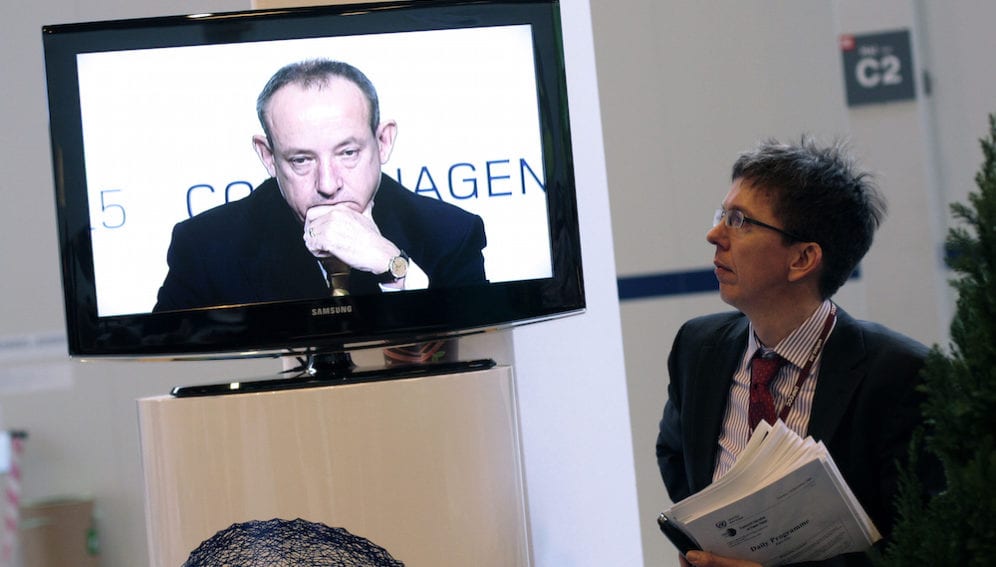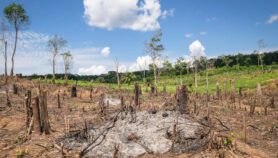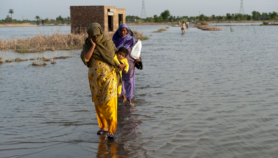By: Anna Valmero
Send to a friend
The details you provide on this page will not be used to send unsolicited email, and will not be sold to a 3rd party. See privacy policy.
[MANILA] Yvo de Boer, former executive secretary of the UN Framework Convention on Climate Change and now director-general of the Seoul-based Global Green Growth Institute (GGGI), believes that global leaders have a unique opportunity at the Paris Climate Conference in December to lay the foundations for a post-2015 climate agenda.
In this interview with SciDev.Net, de Boer shares his thoughts on how the active engagement of the United States and China, and the renewed focus on climate finance and nationally-determined warming cap will stir up optimisms for a satisfactory outcome in the December meeting.
This interview forms part of the continuous SciDev.Net coverage on the climate conference (COP21) and climate change in general.
There is a lot of excitement about COP21. How is it different from the previous climate talks such as the 2009 Copenhagen conference?
Compared to the run-up to the Copenhagen conference around six years ago, international climate negotiations are in much better shape, and this is primarily because there is now less emphasis on a legally binding treaty. Thus, chances of success at the Paris conference are higher with more active engagement from both the United States and China.
In the lead-up to COP21, there is a need to strengthen political will on climate change and find realistic ways to resolve (issues) through dialogue. The Paris conference itself would then be about removing any obstacles and celebrating its success.
Does the Paris climate talks hold the answer for reducing global carbon emissions?
The whole climate issues will not be resolved in Paris, and it’s unrealistic to expect further emission reductions before 2020. Asking countries like China, India and South Africa to reduce their emissions in absolute terms from 2020 onwards appears unlikely. It would be more sensible to ask developing countries to limit their emissions growth in an initial time frame, and then start to reduce them in absolute terms.
Back in 2009 in Copenhagen, expectations were too high and unclear. Six years on, there is more clarity on what the Paris conference should deliver, and when expectations are more within the realm of possibility, there’s a better chance of achieving results.
What are the key points that a successful Paris deal should have? What is a possible outcome that we are looking at in the Paris climate talks?
A successful agreement in Paris would need four key elements. First is for all countries, whether rich or poor, large or small, to commit to clear action on climate change. Second is to ensure that they all pledge to incorporate their commitments into national law. Third is to regularly review all efforts to deliver on the Paris outcome. Fourth is to agree on robust financing in support of developing countries’ efforts.
Financial support for developing and emerging economies is important. In line with an effort to increase their access to climate finance, international organisations and agencies, including GGGI, are helping to develop investment-ready projects.
As for a possible outcome in Paris, countries are likely to make choices based on their national interest. Unlike in Copenhagen where the talks focused on binding commitments, countries now volunteer targets to reduce pollution and deal with global warming. This is an encouraging sign of shared commitment to achieve a positive outcome in Paris.
The Paris agreement will not fully bring us to achieving the target of two degrees Celsius (to limit global warming), but it will put us on track to begin the process of reaching that goal. It will therefore be crucial for the global community to meet every three years or so to review progress on the promises, and if necessary, to agree on further actions.
Compared to five to ten years ago, we are putting the debate much more in the context of an economic model that works to address global challenges. This is important because the primary objective for many developing countries is economic growth and poverty eradication.
How important will the issue of climate finance be in Paris?
First, developed countries need to take steps to show commitments to support developing and emerging countries through public finance. The role of the private sector is important. Greater emphasis needs to be placed on using public finance institutions to leverage private capital and build policy incentives for directing private finance to developing countries.
Second, increasing political commitment to environmental issues is essential. Lack of political interest is leading to budgetary and institutional limitations in the context of climate change. The contribution that green growth could make to strengthen economic growth and poverty eradication is not at the core of high-level political debate in many countries. It is important for governments to realise that the transition to a green pathway is becoming financially viable and there is a need to provide frameworks for green growth that can lower policy uncertainties.
Third, technology at present is not making its way into the market to effectively assist developing countries. This is partly because the costs are too high, the risks are too great, or the markets are too small. These are a set of challenges faced by investors. Developing countries also don’t have an adequate understanding of the technologies that are available, and how and in what ways those technologies could be applied to their countries. So it is essential to create a conducive regulatory environment for technology transfer.
Last, it is critical to write bankable project proposals that translate environmental propositions into a common language for investors and take those proposals to the financial institutions that will finance project implementation.
How can governments tap businesses to provide support for sustainable and clean growth in emerging economies?
The Paris conference could serve as a platform for national and international businesses to find better solutions to shift towards a low-carbon economy. The private sector is increasingly working to shape a society that is sustainable and is developing business models and investment options that recognise global trends on climate, energy, food, water and scarcity.
In fact, many big banks are shifting their priorities to financing renewables, including wind power, solar energy and new technologies as they acknowledge the fact that achieving environmental and sustainability goals is a path to a stable future for “business-as-usual” investment.
One of the challenges is that government representatives — often from the diplomatic and environmental domains negotiating the Paris outcome, who are shaping a business landscape — do not fully understand. Therefore, businesses need to offer Paris negotiators practical business solutions that will give innovation both the help it needs and the chance it deserves.
This article has been produced by SciDev.Net's South-East Asia & Pacific desk.














